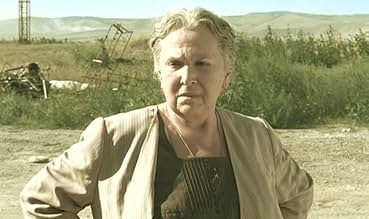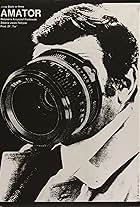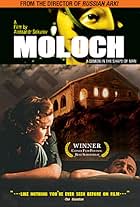IMDb RATING
6.8/10
2.8K
YOUR RATING
An elderly woman takes a train trip to visit her grandson at his army camp inside Chechnya.An elderly woman takes a train trip to visit her grandson at his army camp inside Chechnya.An elderly woman takes a train trip to visit her grandson at his army camp inside Chechnya.
- Awards
- 3 wins & 10 nominations
- Director
- Writer
- All cast & crew
- Production, box office & more at IMDbPro
Storyline
Did you know
- Goofs(A 54:24) In Malika's house, Malika invites Alexandra to take her jacket off. Alexandra does so laboriously. 20 seconds later she's suddenly wearing it again, and works her way out of it once more.
- ConnectionsFeatured in The Voice of Sokurov (2014)
Featured review
A Russian film, which isn't in English, told from the perspective of a seventy or so year old woman, whose attitude towards the dilapidated world she sees is positively existential and whose tale is set during a war very few will have even heard of, was never going to be a box office bank breaker. 2008 film Aleksandra might not be the easiest sell to a young, white, heterosexual male between the ages of 16 and 30; the very definition of the Western 'mainstream', but in Aleksandra, whose director is Aleksandr Sokurov, we can credit a really well made; thought provoking drama which explores and examines a woman of another era coming into contact with a world she is unfamiliar with. The film coming to mutate in a thoroughly well made minimalist piece with wondrous attention to character and to the breaking down of preconceived archetypes.
We begin with the titular Aleksandra, played by Galina Vishnevskaya, an elderly woman on her way to meet with her grandson who's currently located within a military barracks on the front-line of Chechnya. The film implements us within her perspective upon our first interaction, her stepping off of a bus followed by her looking around at what has become of the world as she ventures nearer and nearer the wartime hostilities of the Chechnyan front-line an inviting of the audience to see the world as she sees it. After some difficulty, she eventually arrives at the base camp and meets her grandson Denis (Shevtsov); a soldier looking well worn and with some very blistered feet suggesting he has seen some action. The camp is dry, hot and stagnant; whilst there, Aleksandra gives time to look upon the implements of warfare she sees before her and our alignment to her continues when she ventures around a locale that ought to be as alien to us as it is to her. She observes all of the living, eating and sleeping conditions as well as the men doing certain other things such as polishing their rifles. On another occasion, she is invited to sit inside one of many parked tanks, the film going so far as to have her highlight little things such as the smell of the interior of the thing; all of it eventually coming to have her exclaim her disdain towards it.
The film's predominant covering of the character of Aleksandra sees it cover the sorts of territory that comes with a very frail and rather worn individual seeing the world they inhabit around them. It's eventually established that Aleksandra once had a husband, and so it's put across that she has already had prior negative involvement with men, something which becomes more evident later on. Her observing of the world nearer the front-line is effectively a result of men fighting men and one later scene sees her journey out to a nearby market to collect specific items for the Russian troops she occupies the base with. Here, a young boy causes some irritation by jostling with her in this very public place whereas another man working behind a stall will not sell her any cigarettes, but will carry a look of disdain, both much to her discomfort. The surroundings at the nearby market sees entire rows of apartments torn open from shelling; the people within reduced to living inside of places of dwelling which sport large craters from about the tenth floor and upwards. It is here Aleksandra meets another woman of similar age, and they get along as if they had known one another for many years.
The film finds a quite remarkable balance nicely set between two differing films and their core thesis', namely 2007 Israeli film Beaufort and James Cameron's 1991 sequel to his film The Terminator. Where Beaufort took the item of warfare and distilled it through a dangerously stagnant perspective, exploring the grim absurdities of war by placing a handful of troops at a post and have them merely absorb disjointed and sporadic enemy missile attacks, Aleksandra tells a similar tale of people just inhabiting the outskirts of a war-zone in a deliberately fragmented and stagnant manner reflecting the slow and painful process everything entails. If Aleksandra is the better film, then it's because we have a stonewall lead in the elderly woman around which greater depth is explored; Beaufort's equivalent in an explosives expert in said film introduced to proceedings and tactfully removed twenty minutes in.
A key scene in Cameron's iconic science-fiction/war feature Terminator 2: Judgement Day saw its lead female Sarah Connor sit atop a leading technician's kitchen counter and berate him, indeed the male gender, for being able to do little within the field of creativity but come up with implements dedicated to fighting and warring. Sokurov's film is part extension of this item, and additionally the gradual bringing around of the lead so as to have her come to respect men after a back-story involving an oaf of a husband as well as the destruction and chaos men have brought about to the region she's in. It is something that, with the scene involving a local Chechnyan woman and Aleksandra getting along with her, is suggested wouldn't happen had the women made all the decisions. We feel she comes to really connect with her grandson, revealing secrets about his grandfather that were previously wholly buried and in the other soldiers on the base, an observing of males whom are regimental Russian soldiers but respectful of, instead of dismissive of, the elderly through their experience with warfare which has rendered them worn and lethargic. Refreshingly, Sokurov steers clear of politics; the film's stance on Chechnya remaining positively liberal throughout. His film is more a focusing on just how terrible and seemingly unnecessary the conflict is, rather than just how humanistic and normalised Russians are in comparison to Chechnyans. With a really well executed, minimalist approach to character and his hypothesis, Sokurov executes a taut and engaging film.
We begin with the titular Aleksandra, played by Galina Vishnevskaya, an elderly woman on her way to meet with her grandson who's currently located within a military barracks on the front-line of Chechnya. The film implements us within her perspective upon our first interaction, her stepping off of a bus followed by her looking around at what has become of the world as she ventures nearer and nearer the wartime hostilities of the Chechnyan front-line an inviting of the audience to see the world as she sees it. After some difficulty, she eventually arrives at the base camp and meets her grandson Denis (Shevtsov); a soldier looking well worn and with some very blistered feet suggesting he has seen some action. The camp is dry, hot and stagnant; whilst there, Aleksandra gives time to look upon the implements of warfare she sees before her and our alignment to her continues when she ventures around a locale that ought to be as alien to us as it is to her. She observes all of the living, eating and sleeping conditions as well as the men doing certain other things such as polishing their rifles. On another occasion, she is invited to sit inside one of many parked tanks, the film going so far as to have her highlight little things such as the smell of the interior of the thing; all of it eventually coming to have her exclaim her disdain towards it.
The film's predominant covering of the character of Aleksandra sees it cover the sorts of territory that comes with a very frail and rather worn individual seeing the world they inhabit around them. It's eventually established that Aleksandra once had a husband, and so it's put across that she has already had prior negative involvement with men, something which becomes more evident later on. Her observing of the world nearer the front-line is effectively a result of men fighting men and one later scene sees her journey out to a nearby market to collect specific items for the Russian troops she occupies the base with. Here, a young boy causes some irritation by jostling with her in this very public place whereas another man working behind a stall will not sell her any cigarettes, but will carry a look of disdain, both much to her discomfort. The surroundings at the nearby market sees entire rows of apartments torn open from shelling; the people within reduced to living inside of places of dwelling which sport large craters from about the tenth floor and upwards. It is here Aleksandra meets another woman of similar age, and they get along as if they had known one another for many years.
The film finds a quite remarkable balance nicely set between two differing films and their core thesis', namely 2007 Israeli film Beaufort and James Cameron's 1991 sequel to his film The Terminator. Where Beaufort took the item of warfare and distilled it through a dangerously stagnant perspective, exploring the grim absurdities of war by placing a handful of troops at a post and have them merely absorb disjointed and sporadic enemy missile attacks, Aleksandra tells a similar tale of people just inhabiting the outskirts of a war-zone in a deliberately fragmented and stagnant manner reflecting the slow and painful process everything entails. If Aleksandra is the better film, then it's because we have a stonewall lead in the elderly woman around which greater depth is explored; Beaufort's equivalent in an explosives expert in said film introduced to proceedings and tactfully removed twenty minutes in.
A key scene in Cameron's iconic science-fiction/war feature Terminator 2: Judgement Day saw its lead female Sarah Connor sit atop a leading technician's kitchen counter and berate him, indeed the male gender, for being able to do little within the field of creativity but come up with implements dedicated to fighting and warring. Sokurov's film is part extension of this item, and additionally the gradual bringing around of the lead so as to have her come to respect men after a back-story involving an oaf of a husband as well as the destruction and chaos men have brought about to the region she's in. It is something that, with the scene involving a local Chechnyan woman and Aleksandra getting along with her, is suggested wouldn't happen had the women made all the decisions. We feel she comes to really connect with her grandson, revealing secrets about his grandfather that were previously wholly buried and in the other soldiers on the base, an observing of males whom are regimental Russian soldiers but respectful of, instead of dismissive of, the elderly through their experience with warfare which has rendered them worn and lethargic. Refreshingly, Sokurov steers clear of politics; the film's stance on Chechnya remaining positively liberal throughout. His film is more a focusing on just how terrible and seemingly unnecessary the conflict is, rather than just how humanistic and normalised Russians are in comparison to Chechnyans. With a really well executed, minimalist approach to character and his hypothesis, Sokurov executes a taut and engaging film.
- johnnyboyz
- Jan 2, 2011
- Permalink
Details
- Release date
- Countries of origin
- Official site
- Languages
- Also known as
- Aleksandra
- Filming locations
- Production companies
- See more company credits at IMDbPro
Box office
- Gross US & Canada
- $128,222
- Opening weekend US & Canada
- $9,401
- Mar 30, 2008
- Gross worldwide
- $460,139
- Runtime1 hour 35 minutes
- Color
- Sound mix
- Aspect ratio
- 1.85 : 1
Contribute to this page
Suggest an edit or add missing content

























